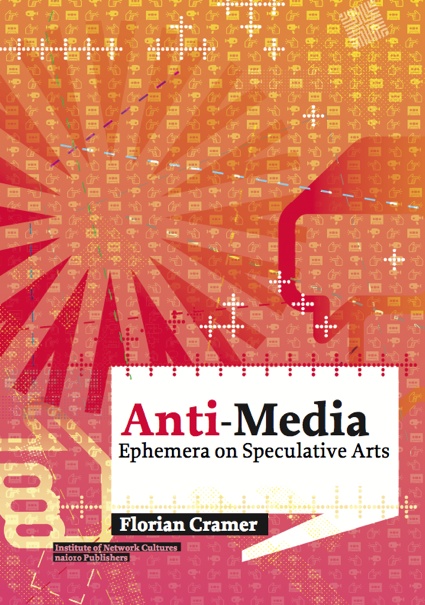Anti-Media. Ephemera on Speculative Arts, by researcher and theorist Florian Cramer.
Soon available on amazon USA and UK.

Publisher NAI Booksellers writes: Literature written in the style of computer code, electro-acoustic compositions with newly created sounds, but also subcultures with clearly identifiable manifestations, from Internet porn to neo-Nazis and anti-copyright activists: high-, low- and subculture have long been impossible to distinguish, including in the degree of their self-reference. Art and media criticism focuses mainly on the concepts, not on the objects themselves. In Anti-Media Florian Cramer shows, through a close reading of cultural expressions and analysis of media and art criticism, how these constantly refer to their tradition, language and medium while trying to subvert them.
I’ve never reviewed nor even read anything that looked remotely like this book before. It is bold, thought-provoking, and extremely fast-paced.
Cramer makes fearless statements about interactivity, pop music, social hacking (that one was a fun chapter), ‘openness’ and many concepts and ideas that we brandish without much thoughts as if they were magical formulas. While reading his book, however, i realized once again that our writings, works and discussions rely on cultural terms which precise meaning, extent, impacts, and limits we often take for granted.
Anti-Media. Ephemera on Speculative Arts makes us sit down and ponder the transformation of archive by the hands of p2p services, the way modern aesthetics theories apply (or rather does no apply) to computing and interactive interfaces, the internet as a literary medium, the Creative Commons licenses and its lack of ethical code, political constitutions and philosophical manifesto and what that means for artists who are relying on it.
Nothing and no one (not even Rocco Siffredi) is safe from Cramer’s sharp questioning and ruminating. You will either embrace his reflections or disagree with them entirely, but a heated debate with this kind of book would, i think, constitute a valuable exercise for the critical minds.
Image on the homepage: 01.org (Eva and Franco Mattes), Nikeground, one of the work discussed in the book.
